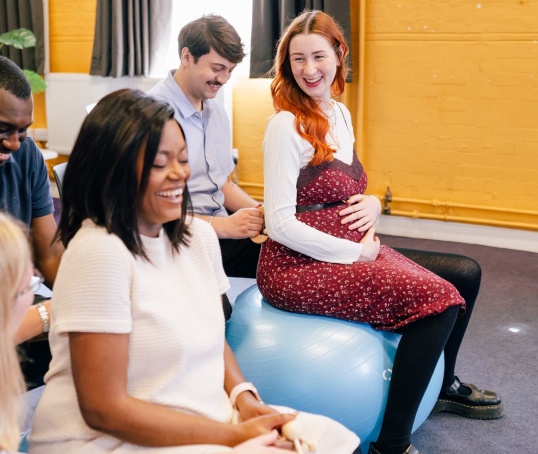Here we look at the experience of vaginal birth, where a vaginal birth can take place and how likely vaginal birth is. We also look at what happens during the birth and what it can feel like.
What is a vaginal birth?
A vaginal birth is when a baby is born through the vagina (va-ji-nah). Vaginal birth is usually planned when the birth is expected to be straightforward. It can also be possible where a baby is breech (positioned bottom or feet first) or there are twins, depending on individual circumstances.
In some situations, such as placenta praevia (pree-via), a vaginal birth will not be possible. A healthcare professional will discuss each individual situation with the parent(s). They should provide information in a way that is understandable and respectful of the pregnant woman or birthing parent’s preferences.
Between April 2022 and March 2023, 61 in 100 women and birthing people gave birth vaginally in England (NHS Digital, 2023).
Stages of labour
For many women and birthing parents, labour begins on its own. It continues at its own pace until the baby is born through the vagina. There are three stages of labour:
- In the first stage of labour, contractions will start which will get stronger.
- The second stage of labour starts when the cervix is fully open, and ends when the baby is born.
- The third stage of labour involves delivering the placenta and clamping the cord.
For others, labour is started by induction (in-duck-shun) which might lead to a vaginal birth or a caesarean (sez-air-ee-an) birth.
Sometimes, a planned vaginal birth changes to vaginal birth with forceps (for-seps) or ventouse (von-tooz).
A planned vaginal birth might also change to an unplanned caesarean birth. Changes in plans are usually because the parent or baby is showing signs of difficulty in coping with labour.
Our NCT antenatal courses give you evidence-based information on all types of birth.
What’s the chance of a vaginal birth?
Here is some information about how pregnant women and people in England gave birth between 1 April 2022 and 31 March 2023 (NHS Digital, 2023):
- Labour started spontaneously for 43 in 100
- Labour was induced for 33 in 100
- Birth was by planned caesarean with no labour for 23 in 100
During the same period, for those with spontaneous labour:
- For 72 in 100, birth was vaginal without any further assistance
- For 14 in 100, birth was vaginal with forceps or ventouse
- For 13 in 100, birth was by unplanned caesarean.
See our article on induction of labour for the chance of vaginal birth after induction.
Even if the previous birth was by forceps or ventouse, the chance of a vaginal birth this time is more than 80 in 100 (RCOG, 2022). See our article on birth after caesarean for the chance of vaginal birth after caesarean.
The rest of this article will concentrate on vaginal birth without any further assistance. You can also read our article about vaginal birth with forceps or ventouse. Or our article on caesarean birth.
Where is it possible to have a vaginal birth?
If planning to give birth vaginally, all places of birth are options (NICE, 2023). Almost every labour starts at home. Some people choose to remain there, and others choose to move to a midwife-led unit or hospital as labour progresses. Read about places to give birth.
How long is vaginal birth?
The length of labour varies between pregnant women and people. It also varies between pregnancies. For each person it can depend on when they notice the start of labour and how they cope with the first stage of labour.
For a first pregnancy in a healthy individual the first stage could be 8-18 hours. However, this is only from when labour is confirmed by the midwife, which could be several hours after it is felt to start. The second stage could be up to three hours (NICE, 2023).
When established labour is confirmed the midwife monitors the health of mother or birthing parent and baby until birth, and for the few hours afterwards. They will explain how labour is progressing unless the parent doesn’t want them to. They will also answer any questions.
If the midwife has any concerns they can consult with a doctor, who might remain involved in the parent’s care. Any concerns raised by the parent(s) should also be respected. In a hospital or midwife-led unit, the pregnant woman or person can usually have one or two people with them for support.
Will there be the same midwife throughout the birth?
Midwife shifts are 8 or 12 hours. So it is likely there will be more than one midwife caring for the labouring parent. During the last part of the birth there will be an extra midwife to care for the baby. Unless giving birth at home the pregnant woman or parent is unlikely to have already met the midwives (depending on the size of the local Trust).
For more detail about monitoring of mother or birthing person and baby in labour read our articles on the first stage and second stage of labour.
When is it possible to go home?
If all goes smoothly, then a couple of hours after the birth the midwives will leave if the birth is at home. The parent and baby can go home if they are in a hospital or midwife-led unit. Ask your midwife about the normal discharge procedure in your area. The mother or birthing parent should never feel pushed out before they are ready.
If the mother or birthing parent, or the baby, want or need care for a little longer, then they may stay in hospital for one night or several nights, depending on what is needed.
For more about what happens immediately after the baby is born read about the birth of the placenta and skin to skin.
Pain relief during vaginal birth
All forms of pain relief can be used during a vaginal birth, but some are restricted to hospital. Read more in our article on pain relief in labour.
Preparing for a vaginal birth
- Attend an antenatal course, or try practising hypnobirthing or yoga
- Having a good diet and regular exercise will mean the pregnant woman or person is as healthy as possible before starting labour. This will give them more strength to help manage the powerful sensations.
- When planning birth it’s useful to understand the role of hormones. Feeling calm is known to support the production of hormones which help labour be more effective.
- Consider the best place of birth to support a plan for a vaginal birth. It might be helpful to find out how busy maternity services are in your area, and what people say about how supported they felt in labour.
- Breathing exercises can be a simple yet powerful technique to stay calm, and many parents choose to attend antenatal courses, or practice yoga or hypnobirthing to help prepare.
- Practising perineal massage during pregnancy can help protect the perineum during birth and reduce the chance of a severe tear.
- Talking with a partner, family, friends or midwife about any concerns will also help find ways to feel more in control and reduce anxiety.
What can be expected from vaginal birth?
For most women and birthing people, a vaginal birth is the option recommended by their healthcare professional because there is:
- More choice over where to give birth (NICE, 2021)
- More choice about who is in the room during labour and birth
- A shorter recovery time and shorter stay in hospital (NICE, 2021; RCOG, 2022)
- Lower chance of wound or womb infection (RCOG, 2022)
- Less chance of serious complications in this birth and future pregnancies (RCOG, 2022; NICE, 2021)
- No chance of abdominal scar tissue (adhesions) which can cause internal pain and problems with operations later in life (RCOG, 2022)
- Hormones are released during labour which support breastfeeding (Prior et al, 2012)
- A higher chance of uninterrupted skin to skin contact after birth, which helps initiate breastfeeding (Moore et al, 2016)
Some pregnant women and people may plan a caesarean birth for personal or medical reasons.
What are the risks of a vaginal birth?
Giving birth vaginally is generally very safe. However, there are some things to be aware of.
- It is common to have a graze or tear around the vagina. These tears are usually minor and heal naturally, or with a few stitches, over the following weeks (RCOG, no date).
- Some tears are more significant. These are more likely when birth has been assisted with forceps or ventouse. Read more about tears and episiotomy (eh-pee-zee-otto-mee) in our article.
- For some pregnant women and people labour is longer and more tiring. This can lead to a negative experience (Carlhäll et al, 2022).
- If labour is not progressing then the pregnant woman or person may be offered additional interventions. These could be augmentation, ventouse or forceps, or unplanned caesarean birth. These additional procedures are associated with more physical and emotional trauma (Carlhäll et al, 2022).
- Depending on where they are labouring, a transfer to the labour ward for assessment and further support may be necessary.
- Regardless of the type of birth, some women and birthing people find the experience traumatic. This is due to the quality of care and support they received (Watson et al, 2021).
Is there a higher chance of incontinence with a vaginal birth?
Around half of pregnant women and people experience stress urinary incontinence (SUI) for the first time in pregnancy. Having SUI after birth is most likely if it has been experienced during pregnancy. The likelihood for first time mothers increases with age and body mass index (BMI is a way of estimating body fat) (Johannessen et al, 2018).
The highest chance of having SUI is when vaginal birth is assisted with forceps or ventouse, and the lowest chance is after one caesarean birth (NICE, 2021). Vaginal birth with no assistance is in the middle.
The most significant predictor of faecal (fee-cal) incontinence (not being able to control the bowels) is an obstetric anal sphincter injury (OASI), which is most likely after vaginal birth with forceps or ventouse (Johannessen et al, 2018).
Benefits of a birth partner during vaginal birth
Research shows that continuous presence from a supportive partner during labour and birth is beneficial. It leads to a higher Apgar score for the baby (which shows the health of the baby after birth), and fewer negative feelings about the birth (Bohren et al, 2017).
Doulas, including NCT doulas, provide physical and emotional support during the birth. Read our article about doula and partner support.
Discussing preferences for birth
Discussing preferences for birth with a partner, friend or your midwife can help the person giving birth identify what is important to them. Making a note of the most important points can be helpful. These might be values about the kind of experience the parents do or don’t want rather than specific detailed choices. Having these notes available can help the healthcare professionals support you.
It can also be helpful for a birth partner to refer to if they are tired and can’t remember what the preference was. The birth partner cannot make decisions on behalf of the woman or birthing person.
NCT Antenatal courses are places to learn about and explore different options, and help make informed and personal decisions about birth.
What are my rights about what kind of birth I can have?
It should always be possible to speak to a senior midwife or consultant midwife if it's felt the right information or support isn't being given.
Their role is to listen and provide information to help make a decision. This could be for a vaginal birth or a caesarean birth. Whatever choice is made should be supported.
If the parent isn’t happy with the diagnosis or treatment they receive, they can ask for a second opinion. Asking for a second opinion shouldn’t negatively impact their care (The Patients Association, no date).
Bohren MA, Hofmeyr GJ, Sakala C, Fukuzawa RK, Cuthbert A. (2017) Continuous support for women during childbirth. Cochrane Database of Systematic Reviews, Issue 7. Art. No.: CD003766. https://doi.org/10.1002/14651858.CD003766.pub6
Carlhäll, S., Nelson, M., Svenvik, M. et al. (2022) Maternal childbirth experience and time in labor: a population-based cohort study. Sci Rep 12, 11930. https://doi.org/10.1038/s41598-022-14711-y
Coates D, Thirukumar P, Henry A. (2020) Women’s experiences and satisfaction with having a cesarean birth: An integrative review. Birth. 47: 169–182. https://doi.org/10.1111/birt.12478
Johannessen, H.H., Stafne, S.N., Falk, R.S. et al. (2018) Prevalence and predictors of double incontinence 1 year after first delivery. Int Urogynecol J 29, 1529–1535 . https://doi.org/10.1007/s00192-018-3577-7
Moore E, Bergman N, Anderson G, Medley N. (2016) Early skin-to-skin contact for mums and their healthy newborn infants’. Cochrane Database of Systematic Reviews. (11):CD003519. Available at: https://doi.org/10.1002/14651858.CD003519.pub4
NHS Digital (2023) NHS Maternity statistics, England, 2022-23. Summary report tables.xls. https://digital.nhs.uk/data-and-information/publications/statistical/nh…
NICE (2021) Caesarean birth [NG192] https://www.nice.org.uk/guidance/ng192 [31 Oct 24]
NICE (2023) Intrapartum Care [NG235] https://www.nice.org.uk/guidance/ng235 [4 Nov 24]
Prior E, Santhakumaran S, Gale C, Philipps LH, Modi N, Hyde MJ (2012) Breastfeeding after cesarean delivery: a systematic review and meta-analysis of world literature, The American Journal of Clinical Nutrition, 95 (5) pp 1113-1135. https://doi.org/10.3945/ajcn.111.030254
RCOG (2020) Information for you: an assisted vaginal birth (ventouse or forceps). https://www.rcog.org.uk/for-the-public/browse-our-patient-information/a… [31 Oct 24]
RCOG (2022) Considering a caesarean birth. https://www.rcog.org.uk/for-the-public/browse-our-patient-information/c… [31 Oct 24]
RCOG (No date) Perineal tears during childbirth. https://www.rcog.org.uk/for-the-public/perineal-tears-and-episiotomies-… [31 Oct 24]
The Patients Association (No date) Getting a second opinion. https://www.patients-association.org.uk/getting-a-second-opinion [14 Nov 24]
Watson K, White C, Hall H, Hewitt A (2021) Women’s experiences of birth trauma: A scoping review. Women and Birth, 34(5) pp417-424. https://doi.org/10.1016/j.wombi.2020.09.016







